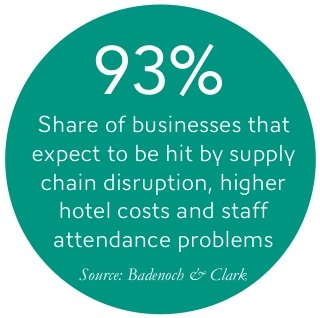The Olympic motto ‘citius, altius, fortius’, meaning ‘faster, higher, stronger’, is intended to encourage each athlete to give his or her best during competition and to strive for excellence.
But athletes won’t be the only ones striving during the Games. As competitors’ cries of triumph and despair ring across Olympic venues this summer, so too will businesses’. Just like the athletes, some companies will win and some unfortunately will lose out during the Games.
One business eyeing up the prize is maintenance group Aspect.co.uk, whose co-founder Nick Bizley believes the 2012 London Olympics hands the company an opportunity it won’t get again. ‘I just can’t see how the Olympics is not going to be good for business,’ states Bizley. For him, the Games brings two big benefits for the firm.
‘Firstly there is an increase of stress on the capital,’ Bizley explains. London’s seams are set to swell as forecasters predict at least 322,000 extra visitors to the UK from the end of July. Bizley comments, ‘Our business is made up of 50 per cent commercial customers, many of whom are in the hospitality sector. They are going to see an increase in business which means they will have a greater need for us.
‘The second advantage I see is that a great deal of our smaller competitors will shut up shop and take a break.’
In May, independent finance company IGF warned businesses of potential cash flow problems as many managers and staff will see the Olympics as an opportunity to take time off. Bizley believes smaller maintenance companies will not have the resources to put an Olympics contingency plan in place so it will be more cost-effective for them to take a fortnight’s holiday.

One firm that is encouraging staff to take annual leave during the Olympics is advertising agency Gyro. According to managing director Claire Wright, many brands have used up much of their ad spend in the lead-up to the Olympics, meaning that little is left for the rest of the year. ‘The summer is usually a quieter period anyway in this industry,’ notes Wright. ‘But this summer will probably be even quieter.’
Wright is expecting the worst and says it will be about ‘pulling it out of the bag’ in the months following the Olympics to make up for a slow summer. ‘Because of this we are trying to get people to take holidays during the Olympic period. It means we will have all hands on deck afterwards,’ she explains.
Marketing meltdown
Wright acknowledges some businesses and particular sectors are going to do overwhelmingly well during the Olympics but is adamant the advertising industry as a whole will suffer. ‘If you are not a sponsor you cannot be seen to advertise during the Olympics, so there has been a lot of activity leading up to the Games that will die off as soon as they begin,’ notes Wright. Both Gyro and Aspect, although visualising a very different few weeks, are in agreement on one thing – it is all a guessing game at the moment.
‘We won’t be able to tell the full impact of the Olympics on business until later in the year when figures for that quarter are released,’ comments Wright. Aspect’s Bizley chimes in, ‘It is all projections at the moment, of course we don’t know what will actually pan out.’
Big win
One company that already knows the Olympics is bringing it gold is JogPost Courier, which has signed a lucrative deal with logistics giant DHL.
‘DHL, like a number of logistics companies, has been challenged by the Olympics and that is where we come in,’ states managing director Kevin Turner.
JogPost Courier offers an alternative to fleets of vans and drivers by replacing them with a team of joggers. Turner proudly describes how the deal came about. ‘One of DHL’s largest customers started to think about the Olympics and said to DHL, “Come on guys, there must be ways to get around it.” He gave them our name and they approached us to see what we could do.’
Keeping things moving
The JogPost team is confident that it will thrive in the busy Olympic period because its delivery agents will beat the traffic. ‘Our joggers can avoid all congestion; parking is not an issue and they can take short cuts that drivers can’t,’ says Turner. Joggers obviously have restrictions on what they can physically carry so dispatchers dealing in more than small parcels and documents will have to look elsewhere.
With road closures and increased congestion in the capital, transportation marketplace UShip predicts a storm ahead for drivers and residents. Director Dean Jutilla says, ‘I think if they can avoid London, drivers generally will. And if people want to move stuff they will probably hold off.’
UShip’s business model involves users visiting its site to ask for quotes for a delivery. Couriers then bid to win that business and when a job has been completed UShip receives a cut from the deal. But while there may not be many deals being done in London during the Olympics, that doesn’t mean UShip can’t win, believes Jutilla.
‘I think what you could see is a major uptick in business just before and after the Olympics,’ he notes. ‘Think about all those people who are renting out their homes and flats during the Games. These people will need to get their stuff moved out before and their stuff moved back in afterwards.’
Like UShip, Aspect is expecting spikes in business in the run-up to and in the aftermath of the Games. ‘Extra people mean more wear and tear so the aftermath of the Olympics could offer big opportunities, we are confident about business then,’ comments Bizley.
But for Gyro’s Clare Wright, the extra footfall is likely to be a negative. ‘It is right on our doorstep so our clients from outside London won’t want to come into the city. That means no meetings will be happening.’
Olympic legacy
Aside from the short-term opportunities or threats presented by the Olympics, some companies are expecting a more lasting impact. In Vancouver, 66 per cent of business reported they had prospered as a result of the Games and 61 per cent continue to benefit to this day.
JogPost Courier’s Kevin Turner believes the Olympics will help map out a bright future for the company. ‘What the Olympics will do is make people think about the ongoing problem of congestion and collecting and delivering in big cities, so afterwards we should see more business too.’
He adds that the increased business during the Olympics, thanks to the DHL contract and other deals it is putting into place, will get the face of the business out there much more and get more people talking. ‘People will see that we are more environmentally friendly and more reliable,’ he hopes.
Other companies are also hoping for longer-term payoffs from the Games, particularly those that have been involved in an official capacity. Engineering firm Wallace Whittle, which helped design and deliver the Athletes’ Village, believes the development will serve as a beacon for sustainable building.
‘The eyes of the world will be on these projects this summer,’ says managing director Brian Mayberry. ‘We’re hopeful that they will act as a showcase for our capabilities and lead to similar innovative projects in future.’
Another engineering firm that was heavily involved in developing the Olympic site is Atkins. London 2012 project director Mike McNicholas says the Games have provided an ideal platform to showcase the best in British engineering.
‘Although we anticipate the positive impact being long-term, we have already seen some early benefits resulting from our involvement. For example, we have been part of Foreign Office delegations visiting Rio de Janeiro to talk about lessons learned on the London 2012 Games.
Be prepared
As the clock ticks closer to the opening ceremony in Stratford’s Olympic Stadium and the athletes are putting in their last bouts of training, businesses too are getting ready for the Games.
Bizley explains, ‘It is going to be hard for us in terms of logistical planning. So we have prepared by working out the best ways for our workers and vehicles to get from A to B and then to park at A or B.’
At present Aspect has a fleet of vans and there is always one man per van. But for the Olympics instead of operating by themselves, each worker will be coupled with another who will act as the driver and drop the other off. ‘This means parking isn’t an issue and all tools can be transported and jobs can get done on time,’ states Bizley.
Gyro too has planned for its disrupted summer. ‘We will use it as a planning period,’ notes Wright. She adds, ‘We will make sure we don’t recruit this summer and we won’t take on freelancers to cover holidays, something we would usually do.’
A BT Global Services survey done after the Vancouver 2012 Winter Olympic Games showed that 50 per cent of companies admitted they should have been better prepared, while 75 per cent underestimated the impact of the Games.
Bizley says it really pays to be positive. ‘The pessimists are hanging on to the idea it is going to be painful for businesses. Of course businesses have to adapt but it is definitely good news.’ He notes that the extra congestion and road closures will be no different to the problems faced when heavy snow or rain falls on the country. ‘But this time we know that it is coming and we have had time to prepare.’
Even Claire Wright, who is not expecting Olympic glory, demonstrates a similar attitude. ‘We are displaying a very British attitude of getting on with it. We have cautious projections and are prepared for the worst,’ she comments.






